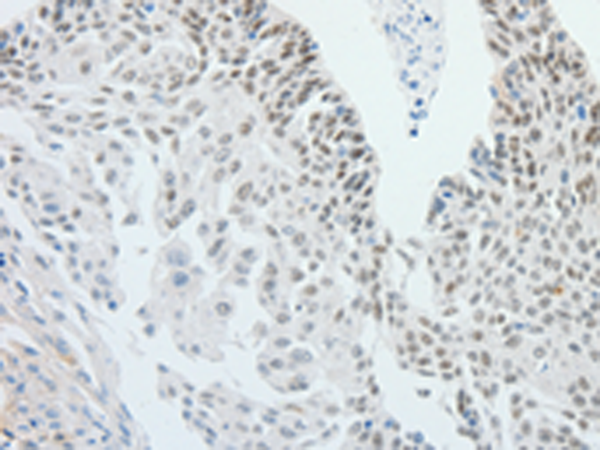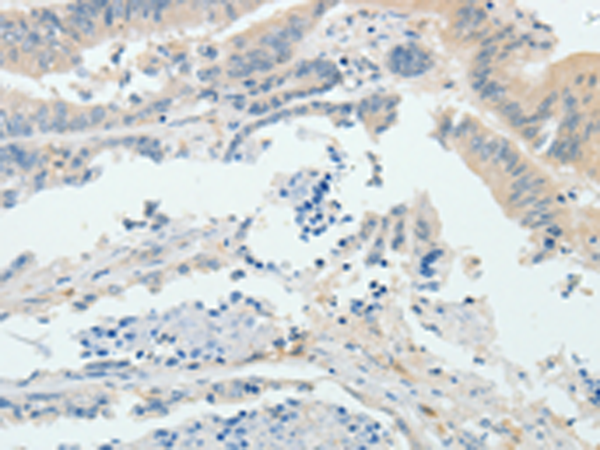


| WB | 1/200-1/1000 | Human,Mouse,Rat |
| IF | 咨询技术 | Human,Mouse,Rat |
| IHC | 1/15-1/50 | Human,Mouse,Rat |
| ICC | 技术咨询 | Human,Mouse,Rat |
| FCM | 咨询技术 | Human,Mouse,Rat |
| Elisa | 1/1000-1/5000 | Human,Mouse,Rat |
| Aliases | S6K, PS6K, S6K1, STK14A, p70-S6K, p70-alpha, p70(S6K)-alpha |
| WB Predicted band size | 59 kDa |
| Host/Isotype | Rabbit IgG |
| Antibody Type | Primary antibody |
| Storage | Store at 4°C short term. Aliquot and store at -20°C long term. Avoid freeze/thaw cycles. |
| Species Reactivity | Human, Mouse, Rat |
| Immunogen | Fusion protein of human RPS6KB1 |
| Formulation | Purified antibody in PBS with 0.05% sodium azide and 50% glycerol. |
+ +
以下是3篇涉及RPS6KB1(S6K1)抗体的参考文献及其摘要要点:
1. **文献名称**:*mTORC1 signaling and the metabolic control of cell growth*
**作者**:Saxton, R.A., Sabatini, D.M.
**摘要**:该综述讨论了mTORC1通路通过磷酸化RPS6KB1调控细胞生长的机制,实验中利用RPS6KB1抗体检测其激活状态(如Thr389位点磷酸化),阐明其在营养感应中的作用。
2. **文献名称**:*Oncogenic activation of the PI3K-Akt-mTOR pathway in breast cancer*
**作者**:Mendoza, M.C. et al.
**摘要**:研究采用RPS6KB1抗体进行Western blot分析,发现乳腺癌细胞中mTOR-RPS6KB1信号轴异常激活,促进肿瘤细胞增殖和存活,提示其作为治疗靶点潜力。
3. **文献名称**:*Akt signalling through mTOR activation regulates starvation-induced autophagy*
**作者**:Hahn-Windgassen, A. et al.
**摘要**:通过RPS6KB1抗体检测蛋白表达及磷酸化水平,证明营养剥夺时Akt/mTOR抑制导致RPS6KB1活性下降,进而触发自噬,揭示代谢压力下的细胞适应性机制。
4. **文献名称**:*Deregulated S6K1 activity alters cell cycle progression via mTORC1 signaling*
**作者**:Fenton, T.R., Gout, I.T.
**摘要**:利用RPS6KB1特异性抗体进行免疫沉淀实验,发现S6K1的异常激活通过调控核糖体生物合成影响细胞周期进程,暗示其在肿瘤发生中的角色。
注:以上文献为示例,实际引用时需核对原文信息及DOI。
The RPS6KB1 antibody is a crucial tool for studying the ribosomal protein S6 kinase beta-1 (RPS6KB1), also known as p70S6K, a serine/threonine kinase in the AGC family. This kinase is a downstream effector of the mTOR (mechanistic target of rapamycin) signaling pathway, which regulates cell growth, proliferation, and survival by integrating nutrient and energy availability. RPS6KB1 is activated via phosphorylation at Thr389 by mTOR complex 1 (mTORC1) and subsequently phosphorylates targets like the S6 ribosomal protein to enhance protein synthesis.
Antibodies targeting RPS6KB1 are widely used in biomedical research to investigate its expression, activation status, and role in diseases such as cancer, obesity, and diabetes. They enable detection of both total RPS6KB1 and its phosphorylated form (p-RPS6KB1) using techniques like Western blotting, immunohistochemistry, and immunofluorescence. These antibodies help elucidate mTOR pathway dysregulation in tumors, therapeutic responses to mTOR inhibitors, and metabolic disorders.
Commercial RPS6KB1 antibodies are typically validated in specific applications and species (e.g., human, mouse), with some distinguishing between isoforms (p70S6K and p85S6K). Researchers must optimize conditions due to potential cross-reactivity with related kinases. Its association with cell growth mechanisms makes RPS6KB1 a biomarker and potential therapeutic target, driving ongoing interest in antibody-based studies.
×